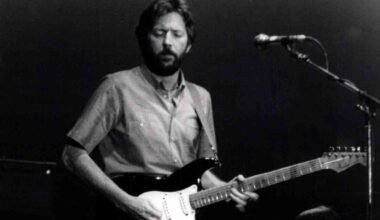If any one member of Queen had been removed, it’s unlikely that anyone would have talked about them years later. Despite the enormous amount of acclaim bestowed upon Freddie Mercury to this day, it was always the collective Queen sound that elevated them. It lifted them from another brilliant rock act to one of the most talented ensembles to ever enter a studio. Even though the group could have transformed anything into gold when they stepped behind the microphone, Brian May believed that. He believed one of the group’s most valuable assets was not a musician.
As the band became used to the studio setting, all of their signature sounds were already in place. Their layered vocal harmonies exploded out of the speakers from the first note of ‘Keep Yourself Alive‘ on their debut. May’s technique of making his guitar sound like a one-man orchestra during the solo added to the distinctive quality.
When the group became more creative in the studio with Queen II, they began to integrate effects that could not be replicated live. Taking inspiration from musicians like The Beatles and Jimi Hendrix, the band transformed the studio into an instrument in its own right, collaborating with producer Roy Thomas Baker to achieve their goals on albums such as Sheer Heart Attack.
After discovering that their management was not paying them, the group hunkered down for their fourth outing to produce the best record possible. Although the band already had the rock behemoth ‘Bohemian Rhapsody‘, Mike Stone was in charge. He transformed it into one of the most epic aural journeys of the 1970s.
Stone, serving as the group’s engineer, earned notes for being hands-on during production. He assisted the group in bringing their wildest ideas to life. When working on a tune like ‘Lazy On a Sunday Afternoon,’ the band would record vocals through a metal can. This would sound distorted as if Mercury was talking into a megaphone.
Although each song had its distinct sound, Brian May believed Stone’s creativity helped the ensemble thrive in the studio. May recalls those records were a collaborative effort with Stone, not just four musicians working in tandem. They continually experimented with different concepts to capture the sound they desired on tape.
When speaking with Classic Albums, Brian May emphasized Stone’s importance in crafting the band’s finest songs. He said, “I’ve said this more than once, I’m sure, but Mike Stone is truly the unsung hero of the band in this whole thing.” From A Night at the Opera to A Day at the Races, he collaborated with us. The guy was truly a phenomenon. I recall having a great time. “We were a good team.”
While Stone eventually left the band after recording News of the World, he went on to lead other rock legends. He collaborated with Journey on their colossal album Escape and eventually worked with David Coverdale to create Whitesnake’s breakthrough singles. Even though Queen would subsequently advance recording techniques in the 1980s and beyond, Mike Stone could be called the band’s fifth member. This was especially true throughout their 1970s masterpieces.








